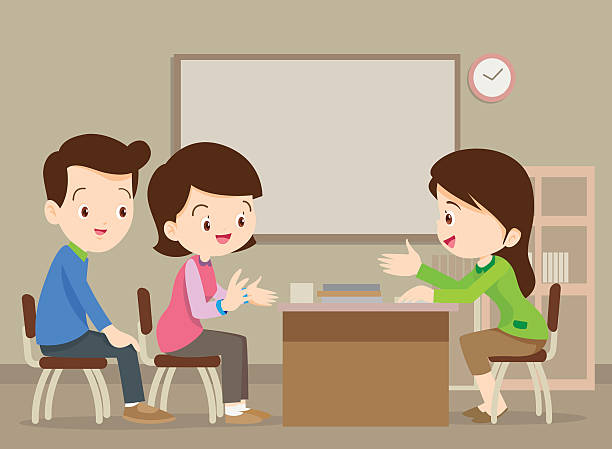Why Parent-Teacher Communication Matters
Parent-teacher communication is essential for several reasons. It helps parents stay informed about their child’s progress, allows teachers to better understand a student’s home environment, and fosters a stronger support system for the child.
Building Trust and Cooperation
Open lines of communication build trust between parents and teachers, ensuring that both parties are on the same page when it comes to a student’s needs. This trust encourages cooperation, allowing for more effective strategies to be implemented at home and in the classroom. When teachers and parents work together, students benefit from a consistent, unified approach.
Tracking Student Progress
Regular communication ensures that both parents and teachers are aware of a student’s strengths, weaknesses, and areas for improvement. Teachers can provide insights into the student’s academic performance, behavior, and social interactions, while parents can offer additional context, such as changes at home that may affect the child’s performance.
Supporting Social and Emotional Development
Parents and teachers play a pivotal role in a child’s social and emotional growth. Communication ensures that teachers can alert parents to any concerns regarding their child’s behavior or emotional well-being, while parents can provide teachers with any relevant information about challenges the child may be facing outside of school. This collaborative approach promotes a holistic view of the child’s development.
Effective Ways to Communicate with Teachers
There are various ways to communicate with teachers, and choosing the right method depends on the context and the urgency of the message. Here are some common ways to engage in meaningful conversations.
In-Person Meetings
Face-to-face meetings are one of the most effective ways to discuss a child’s progress and address any concerns. In-person communication allows for a more personal connection, where parents and teachers can have a focused, uninterrupted conversation. Parent-teacher conferences are a great opportunity for these types of meetings.
Email Communication
Email is a convenient and effective way to communicate with teachers, especially for non-urgent matters. It’s also a great way to maintain a record of the conversation. Parents can express concerns, ask for clarification on assignments, or inquire about their child’s progress. Teachers can also use email to share updates or reminders with parents.
Phone Calls and Video Chats
Phone calls are ideal for more urgent matters or situations that require a personal touch. If a parent cannot attend an in-person meeting, a phone or video call can provide the same level of connection. Many teachers are also now open to using video conferencing platforms to facilitate parent-teacher conversations.
School Portals and Apps
Many schools have online portals or apps that allow parents to track their child’s progress in real-time. These platforms are often used to communicate about grades, assignments, and school events. For parents with busy schedules, these tools are a convenient way to stay up-to-date without needing to arrange a formal meeting.
Establishing Positive Relationships with Teachers
Building a good relationship with your child’s teacher sets the stage for effective communication. Here’s how you can establish a positive connection.
Approaching Teachers with Respect
Teachers are professionals who care deeply about their students. When you approach them with respect and an open mind, it sets a positive tone for the relationship. Instead of just focusing on problems, try to approach conversations with an attitude of collaboration.
Being Open and Honest
Be transparent with the teacher about any issues your child may be facing at home. Whether it’s a family change, health concerns, or social difficulties, keeping the teacher informed helps them better understand the child’s needs. Likewise, don’t be afraid to ask the teacher for their insights and advice.
Regular Check-ins
Even if there are no immediate concerns, regular check-ins can keep the lines of parentingpro. net. A quick email or meeting just to touch base can help keep you informed about how your child is progressing and can give you the opportunity to address any small issues before they become bigger ones.
Overcoming Communication Barriers
There are several challenges that can hinder effective communication between parents and teachers. Here are some common barriers and ways to overcome them.
Language and Cultural Differences
In diverse communities, language and cultural differences can make communication challenging. Schools often offer translation services, and some teachers are bilingual, which can help bridge the gap. Don’t hesitate to ask for assistance if needed, as teachers want to ensure that all parents are involved in their child’s education.
Time Constraints
Parents and teachers are often juggling busy schedules, which can make finding time for meetings challenging. To overcome this, use email, school portals, or phone calls for quick updates. You can also ask the teacher for specific times they’re available or explore virtual meetings to work around your schedule.
Misunderstandings and Conflict
Conflicts may arise from misunderstandings or differing expectations. If this happens, it’s essential to address the issue calmly and professionally. Keep the focus on your child’s well-being and seek a resolution through respectful dialogue. Remember, both parents and teachers want what’s best for the child.
The Role of Parent-Teacher Conferences
Parent-teacher conferences are essential in fostering meaningful dialogue between parents and teachers. These meetings are a great opportunity to go deeper into the child’s academic and social development.
How to Prepare for a Parent-Teacher Conference
To make the most of a conference, come prepared with questions and specific areas of concern. Review your child’s assignments, grades, and any communication you’ve had with the teacher. This will ensure that you’re focused on the most important issues during the meeting.
Making the Most of Your Meeting
During the meeting, be an active listener. Allow the teacher to share their observations, and ask for clarification on any points you don’t understand. Collaborate with the teacher to create an action plan that addresses any challenges your child may be facing.
Setting Goals and Follow-ups
Conferences should result in actionable goals. Discuss steps you and the teacher can take to support your child’s development. Schedule follow-up meetings or check-ins to monitor progress and adjust strategies as needed.
Digital Tools for Parent-Teacher Communication
In today’s digital age, technology offers various tools to improve communication between parents and teachers. These tools provide real-time updates and foster easier communication.
Learning Management Systems (LMS)
Many schools use Learning Management Systems to track assignments, grades, and other student data. These platforms allow parents to monitor their child’s progress and communicate with teachers more efficiently.
School Apps for Updates
School-specific apps are becoming more common, allowing parents to receive updates on their child’s schoolwork, upcoming events, and even attendance. These apps can streamline communication and make it easier for parents to stay informed.
Online Parent Portals for Grades and Assignments
Parent portals allow parents to access their child’s academic performance, grades, assignments, and attendance records. This instant access keeps parents updated and provides an opportunity for timely communication if any concerns arise.
Why Parents Should Stay Involved Year-Round
Parent-teacher communication shouldn’t be limited to parent-teacher conferences. Staying involved throughout the year is crucial to maintaining a strong relationship and ensuring that your child receives the support they need.
Consistency is Key
Frequent communication ensures that both parents and teachers are aligned in their approach to supporting the child. Consistent involvement helps identify and address potential issues before they escalate.
Being Proactive in Addressing Concerns
If something seems off, don’t wait for a problem to grow. By being proactive and addressing concerns early, you can help your child overcome challenges quickly and ensure they stay on track.
Celebrating Academic and Social Success
Don’t just reach out when there’s a problem—celebrate your child’s successes too. Positive feedback from both parents and teachers helps boost a child’s confidence and motivation.
Conclusion: Fostering a Partnership for Student Growth
Effective parent-teacher communication is a critical component of a child’s success in school. When parents and teachers work together, they create a supportive environment where students can thrive academically, socially, and emotionally. Regular, open communication helps ensure that the child’s needs are met and that everyone is working toward the same goals. By building strong, positive relationships with teachers, parents can provide the best support for their child’s development.


:max_bytes(150000):strip_icc()/discipline-strategies-for-tweens-4115350-1529d99ab8ac4c4481e62934f83457d7.png)

